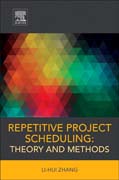
Repetitive Project Scheduling: Theory and Methods is the first book to comprehensively, and systematically, review the new methods for scheduling repetitive projects that have been developed in response to the weaknesses of the most popular method for project scheduling, the Critical Path Method (CPM). As projects with significant levels of repetitive scheduling are common in construction and engineering, especially construction of buildings with multiple stories, highways, tunnels, pipelines, power distribution networks, and so on, the book fills a much needed gap, introducing the main repetitive project scheduling methods, both comprehensively and systematically. It presents the core methodologies, including identifying the controlling path and the controlling segment, shows how to convert RSM to a network model, and provides examples based on practical scheduling problems. Introduces the repetitive scheduling method with analysis of the pros and cons, as well as the latest developmentsDiscusses the two basic theoretical topics, identifying the controlling path and transferring the RSM to a network model Focuses on practical problems and algorithms Essential resource for researchers, managers, and engineers in the field of engineering project and construction management INDICE: 1. Overview of repetitive project scheduling1.1 Project management and project scheduling1.2 Description and characteristics of repetitive project1.3 Origination of repetitive project scheduling1.4 Research significance of repetitive project scheduling1.5 Existing achievements of repetitive project scheduling1.6 Main problems of repetitive project scheduling2. Controlling path and controlling segment analysis2.1 Literature review2.2 Types of activity in repetitive project2.3 Graphic method of determining controlling path2.4 Mathematical method of determining controlling path3. Converting repetitive project scheduling model to network model3.1 Literature review3.2 Recommended conversion method3.2.1 Conversion of activities3.2.2 Conversion of logical relations3.2.3 Conversion of precedence relations3.2.4 Displaying of space3.3 Comparison between the controlling path in RSM and the critical path in network 3.4 Comparison of criticality3.5 Comparison of float4. Resource allocation problem in repetitive project4.1 Literature review4.2 Definition of work continuity constraint4.3 Definition of resource consistency constraint4.4 Interpreting time optimization problem4.5 Recommended optimization method and its corresponding principle4.6 Examples5. RCPSP in repetitive project5.1 Literature review5.2 Proposing the optimization model5.3 Recommended heuristic method5.4 Examples6. RLP in repetitive project6.1 Literature review6.2 Introducing an integer programming method6.3 Introducing a heuristic method6.4 Examples7. DTCTP in repetitive project7.1 Literature review7.2 Interpreting the DTCTP considering resource continuity7.3 Interpreting the DTCTP considering soft logic
- ISBN: 978-0-12-801763-0
- Editorial: Elsevier
- Encuadernacion: Rústica
- Páginas: 110
- Fecha Publicación: 01/10/2015
- Nº Volúmenes: 1
- Idioma: Inglés
